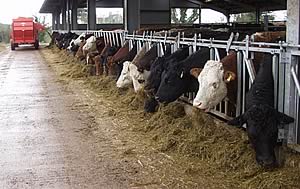 |
|||||||||
|
|||||||||||||||||||
| Dutch
Research Puts Value On Routine Grass Silage Inoculant Use 12/05/06 Treating grass silage with an effective biological inoculant will improve nutritional value significantly across a wide range of dry matters and cuttings dates, according to recent studies at the Dutch research institute at Lelystad.
Reporting on his work at Wageningen UR at Alltech's recent feed industry Symposium in Kentucky, USA, Dr Ad van Vuuren showed that treatment of grass silage with the bacteria and enzyme inoculant Sil-All4x4 led to the synthesis of 6% more microbial protein - the best form for milk production - when compared with an untreated control. A significant improvement in microbial protein was achieved at three varying dry matters (20%, 30% and 50%), and at cutting dates in May and September, indicating that valuable benefits are gained under the vast majority of UK silage making conditions. Extra feed value resulting from the Sil-All4x4 treatment was shown in the Lelystad work to equate to significant additional milk production. When interpreted under typical UK conditions, this extra feed value would support an estimated 0.7 - 0.8 kg/cow/day of milk production, which Alltech's European Forage Product Manager Matthew Smith says makes the inoculant cost effective whatever the conditions. "It is significant that these results remained consistent across the full spectrum of conditions in the study, so farmers can be more confident about a strategy of routine inoculant use," he commented. "The important thing for any farmer is to assess the value of the extra production against the cost of the inoculant, bearing in mind that improved feed value is only part of the story. The true value of the inoculant should include increased production, and also any savings in bought in feed and reduced ensiling losses."
|
|||||||||||||||||||

|
|
||||||||||||||||||
| home | agri-services | pedigree
pen | news | dairy | beef | machinery property | organisations | site map |
|||||||||||||||||||
